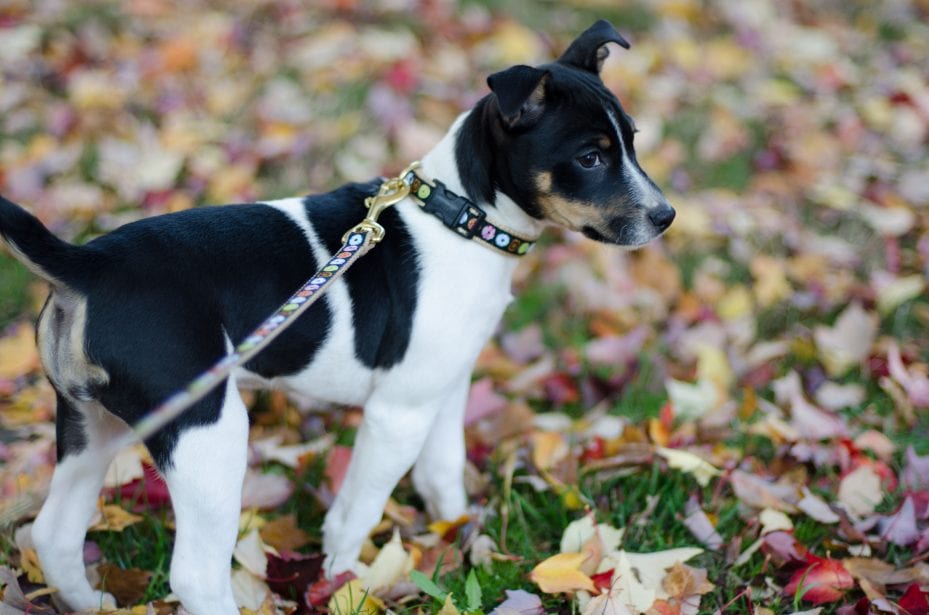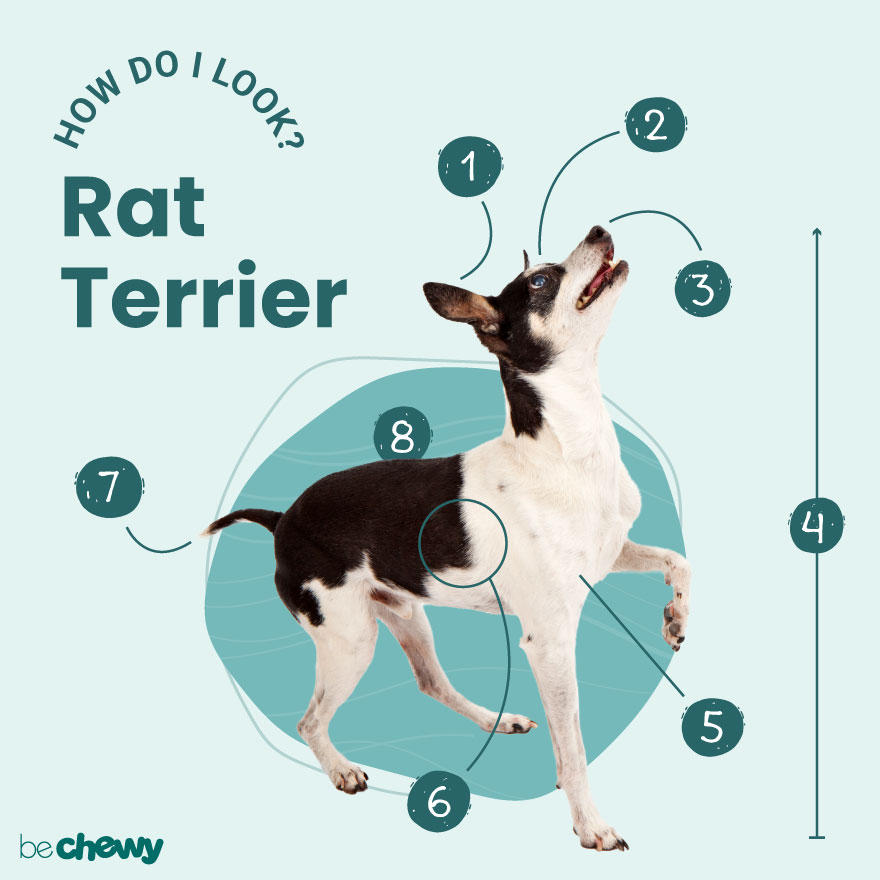Looking for a truly loyal BFF? Rat Terriers live up to the term “man’s best friend”—their temperament is as devoted as their ears are perky. (Spoiler: That’s a lot.) They’ll go where you go; they’ll love who you love (mostly). You’ll have to forgive them for having a bit of a stubborn streak—they may be too smart for their own good, but they are likely to make up for it by being a fast learner in training or winning you a ribbon in an agility show. If you commit to teaching them your rules, you’ll have an energetic, playful bestie to fall in love with in no time.
Breed Snapshot
Temperament:
EnergeticAffectionatePlayfulCoat Color:
Black And WhiteBlack White And TanBlack Tan And WhiteBlue White And TanRed White And SableWhite And ApricotWhite And BlackWhite Black And TanWhite And Blue FawnWhite And BlueWhite And ChocolateWhite Chocolate And TanWhite And FawnWhite And LemonWhite And RedWhite And SilverWhite And TanWhite
Best For
Energetic and playful, Rat Terriers want to be your bestie. These fast learners thrive in busy, active households with pet parents who can provide early socialization, daily training and lots of playtime. But don't worry, when it comes to their grooming needs, they're low-maintenance.
Rat Terrier Temperament
Rat Terriers are a big personality in a compact body. Inquisitive and highly intelligent, these qualities work in their favor when it comes to puzzles and games that will provide seemingly endless entertainment.
When they’re given a job to do, however, things get serious. They give 100 percent whether they’re hunting vermin, running agility or having a training session. Because Rat Terrier dogs were bred to both function as a working dog and live with a family, they can master both equally.
These small-sized dogs are usually very friendly and tend to get along with kids and other dogs, but it’s important to remember that all dogs are individuals so this can differ from Rattie to Rattie. As long as your dog is properly socialized (aka introduced to different people and environments) from a young age, they’ll be a great companion for all the family, and a friend to anyone they meet. It’s also important to teach kids how to interact with dogs.
As their name implies, these dogs kind of have a thing for vermin. So you may want to rethink a Rat Terrier if you keep house with rats, mice, hamsters or birds unless you take precautions to keep them separated. The same goes for cats, but with early and deliberate introductions as Rat Terrier puppies, the two can definitely thrive together.
Rat Terriers are good watchdogs, so don’t be surprised if they bark when someone comes to the door. If you feel that it’s excessive, there are options to help you reduce your dog’s barking.
Overall, Rat Terriers are devoted to their people and they love to be included, so don’t leave them alone for too long or they will pine for you. Don’t forget that they still operate on instinct—no matter their training, your Rattie might still make the occasional, sudden lunge for a squirrel on your afternoon walk. They’re just doing what they were bred to do!
How to Care for a Rat Terrier
Rat Terriers are pretty low maintenance when it comes to their grooming needs, but when it comes to training, they need daily exercise and a pet parent who is as determined and dedicated as they are. They’re affectionate and love family life, and they are adaptable enough to be anything from apartment-dwellers to farm hands.
Rat Terrier Health
Rat Terriers have a decent life expectancy and can live 12-18 years. They tend to be a very healthy and active breed, but, like all dogs, they are prone to certain health problems. It’s good to know ahead of time what these concerns could be so you can look out for any tell-tale signs.
- Hip Dysplasia: This often-genetic condition can occur when the hip joints are loose, causing pain, cartilage loss and scar tissue if not addressed. Treatment options include weight management, physical therapy or surgery.
- Patellar Luxation: This causes the kneecap to dislocate, resulting in pain and loss of function. It can be genetic and treatment option include joint supplements, pain medication and, in severe cases, surgery.
- Legg-Calve-Perthes Disease: The hip joint is formed from the ball and socket. In Legg-Calve-Perthes disease, the ball, or top of the femur bone, starts to deteriorate, which can be very painful. Surgery is often the treatment of choice.
- Heart Disease: Heart problems can be common when raising a Rat Terrier into their senior years. Your veterinarian will want to monitor their heart for any concerns so that if there’s an issue with their heart or the heart valves that pump blood, these can be addressed. If your vet hears a heart murmur, they will likely refer you to a veterinary cardiologist for an echocardiogram (ultrasound of the heart) to determine the underlying cause.
- Eye Disease: Rat Terriers are prone to a certain disease called primary lens luxation that can lead to teary, red and/or cloudy looking eyes. Eventually, dogs can go blind. If you notice any of these signs or have concerns about your pet’s eyes or vision, please contact your vet immediately.
Rat Terrier History
Rat Terriers earned their name through history by being experts at catching rats. They originated on American farms, where these little dogs were perfect for exterminating the vermin that could potentially wreak havoc on stored food needed for survival. In fact, they were specifically bred for this very task and in the 1910s and 1920s, they were the most common farm dog in the US.
The Rat Terrier dog breed comes from a mix of several different breed types, including the Smooth Fox Terrier, Manchester Terrier, Whippet, Italian Greyhound and Beagle. Farmers used different combinations of breeds to land on the traits they required for the job. For instance, Whippets and Italian Greyhounds were included for their speed and the Beagle for their superior hunting skills. An American original, it’s said Teddy Roosevelt is responsible for naming this breed.
As farmers started killing rats with poison, Rat Terriers became less popular until the 1990s when they started making a comeback. The Rattie was officially recognized by the American Kennel Club (AKC) in 2006.
Want a Rat Terrier? You can find a list of reputable Rat Terrier breeders on the AKC’s website. What’s the average cost of a Rat Terrier puppy? Depending on the breeder, expect to spend $500-$1,100 for a Rattie pup. Puppies bred through a reputable breeder will have their puppies screened for any concerns medically and behaviorally and may come with pedigree papers. You can also reach out to Rat Terrier rescue organizations to adopt a Rattie, keep an eye out for them at your local animal shelter, or search Chewy’s database of adoptable dogs in your area.
FAQs
Do Rat Terriers shed?
Yes, Rat Terriers shed the most in the spring and fall, but do shed moderately all year. You can keep this shedding to a minimum by brushing them weekly.
Do Rat Terriers bark a lot?
Rat Terriers bark when they feel it’s necessary. Because they tend to be on alert, they may bark to alert you when someone’s at the door.
Are Rat Terriers good family dogs?
Yes, Rat Terriers generally make excellent family dogs, including those with kids and other pets. They do best with families who understand their energy levels and exercise needs and aren’t going to leave them alone for long periods.
Can Rat Terriers swim?
Rat Terriers love the water and enjoy swimming. In fact, it’s a great way for them to exercise. Of course, they should always be supervised during this activity.
What are the most common Rat Terrier mixes?
- Rat Terrier-Chihuahua mix (Rat-Cha)
- Rat Terrier-Beagle mix (Raggle)
- Rat Terrier-Jack Russell mix (Jack-Rat)
- Rat Terrier-Dachshund mix (Rat Doxie)
- Rat Terrier-Lab mix
Note: These are not purebred dogs but mixed breeds.

Top Takeaways
Rat Terriers make wonderful dogs for families living in any size of home. They love people and and are good with other dogs, and even cats, when they’ve been socialized from a young age. They need consistent exercise and and plenty of mental stimulation, too. Ratties are just as happy relaxing with you at home as they are on the agility course, and their zest for life and charming characteristics might make you want more than one.
Expert input provided by Dr. Antje Joslin, veterinarian for Dogtopia; certified dog trainer and behavior consultant Julie Parker, CTC, CPDT-KA owner of Rocky Mountain Dog Training; and AKC/UKC Judge Tracey A. Kallas, RTCA, Judges Education Coordinator and Vice President, Breeder of Merit at K2 Rat Terriers.
Breed characteristic ratings provided by Dr. Sarah J. Wooten, DVM, CVJ, a veterinarian at Sheep Draw Veterinary Hospital in Greeley, Colorado; dog trainer and behavior consultant Irith Bloom, CPDT-KSA, CBCC-KA, CDBC, owner of The Sophisticated Dog, LLC, in Los Angeles; and certified animal behavior consultant Amy Shojai, CABC, in Sherman, Texas.
The health content was medically reviewed by Chewy vets.

Search for Adoptable Rat Terriers Near You
Female Names
- Luna
- Daisy
- Bella
- Lucy
- Sadie
- Pepper
- Maggie
- Mia
- Lola
- Penny
Male Names
- Milo
- Buddy
- Max
- Cooper
- Jax
- Toby
- Rocky
- Jack
- Bandit
- Oreo
Share:






























